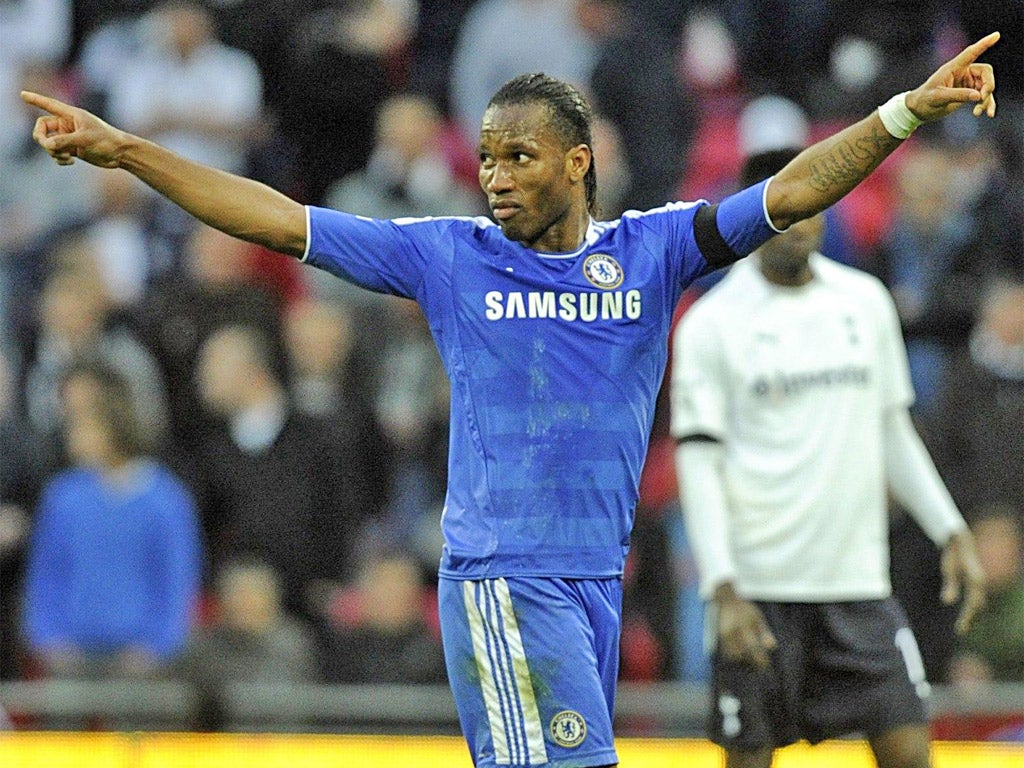James Lawton: Barcelona should beware provoking Didier Drogba's final fling
Tonight we will get to see how well Chelsea's restored certainties can be preserved

A lot has happened since the events of the night of 6 May 2009 at Stamford Bridge and Dani Alves of Barcelona can rearrange them as profoundly as he likes.
But then he might be wise not to press too hard his edited version on Didier Drogba, especially, before tonight's return to the battle lines of arguably the most distorted semi-final in the history of the Champions League.
The claim of Alves that it was fear and not relentless referee error by a hapless Norwegian named Tom Henning Ovrebo which denied Chelsea the chance of a final re-match with Manchester United in Rome landed this week not so much as historical revision as outrageous provocation.
It is an old scab, and the danger of picking it may have declined along with Chelsea – and the graduation of Barça to what many believe is an ultimate level of the game – but for Drogba, whether he starts at the heart of the action or smoulders on the bench for a while, and his old guard team-mates it is hard to imagine anything quite so guaranteed to stimulate some of the last of their ambition.
When Andres Iniesta scored three minutes into added time – and took his team through on away goals – the rage of the big man from the Ivory Coast was so strong it seemed possible that it would never die. Maybe it is true that three years on the 34-year-old finds it that much harder to channel his deepest emotion into decisive physical action. However, Barça, despite all their legitimate pomp, should perhaps not take this entirely for granted.
This is particularly so if they linger for more than a moment or two over the more dramatic of recent strikes from a still formidable armoury.
His running header in the second- leg defeat of Napoli had the authority of a bolt of lightning. So did the goal that ambushed the composure of Spurs at Wembley last Sunday. If this is the last of Drogba, it is surely more than a faint echo of the past. Certainly it makes his involvement tonight, at least at some point, more dangerous to Barça than even the most optimistic progress report on Fernando Torres.
Indeed, the late possibilities of Drogba and Frank Lampard and John Terry under the old pro stewardship of Roberto di Matteo provide more than enough incentive to reflect on some extraordinary years of achievement, a body of work which came so close to fulfilment in spite of the unwitting sabotage of owner Roman Abramovich.
Not the least extraordinary fact of Chelsea's pursuit of the Champions League is that in the last five years they have reached the semi-finals three times and the final once – and on each occasion while in the hands of a temporary manager.
Avram Grant's brief, bizarre control of the team made by Jose Mourinho reached its apex in Moscow in 2008 against United after the taut semi-final victory over Liverpool. Guus Hiddink felt much of the angst of Drogba, without displaying a fraction of it, after the outrage perpetrated by Ovrebo.
Now Di Matteo goes against Barcelona with a team which has not so much been revived but re-introduced to some of the fundamental driving forces of the professional game, the most significant including a degree of trust between coach and players and some basic consistency in tactics.
For a little while there was a game of distributing blame at Stamford Bridge. The old guard brought out the knives, it was said. Andres Villas-Boas floundered on the precipice of his own inexperience. But however you cut it, here was a dysfunctional football club, one buffeted by one too many departures from the classic values of professional organisation and motivation.
How has Di Matteo done it? Mostly by understanding the psychology of professional football players, knowing how it is when they move towards and beyond the limits of their old power. Villas-Boas never tired of announcing that he was the head of a project, one of building new foundations, creating renewal.
In fact he was lost and the job he handed over to Di Matteo was relatively simple. It was one which all football managers, however generous their resources, have to tackle at some point in their careers. It is called making the best of what you have.
In Di Matteo's case what he has might not carry him too far into an uncharted future but, as we have seen from time to time since the start of what seemed like a hopeless assignment, it is not without an impressive remnant or two.
Under Mourinho, Chelsea were not a beautiful team but they knew, precisely, what they were doing. In recent weeks there has been a return of some of those certainties and tonight, no doubt, we will get to see how well they can be preserved against the best football team on earth.
What can be assumed safely enough is that whatever the years have brought to Didier Drogba it does not include fear.
Subscribe to Independent Premium to bookmark this article
Want to bookmark your favourite articles and stories to read or reference later? Start your Independent Premium subscription today.

Join our commenting forum
Join thought-provoking conversations, follow other Independent readers and see their replies